Let us understand the types of COVID-19 vaccines

A world where Face masks and 6 feet distance has become a necessity..!!
Brief Intro on COVID-19 Pandemic
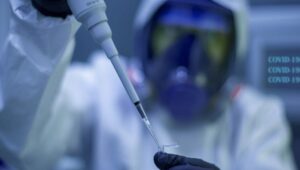
Begin in Wuhan, China, Coronaviruses (COVID-19) is an infectious disease that causes mild to severe respiratory disorders, also even death sometimes. Spread across several nations, WHO (World Health Organization) has declared the COVID-19 as a pandemic that requires an overall integrated effort to fight against it.
A virtual Race among Biotech Companies and Governments to develop the vaccine rapidly, But How?
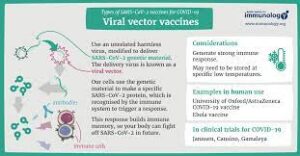
Developing a vaccine in less than a year is not an easy deal, but the coordinated effort of scientists, doctors, researchers, and manufacturers has made it possible.
Well, the vaccine might have developed, but the people have apprehensions over its credibility. People are still in a dilemma to get the vaccination done, and they have foremost concerns regarding its compromised safety.
To bring this pandemic to an end and fight against corona, everyone needs to be immune to the coronavirus, and it is only possible if everyone gets vaccinated. So, an understanding of how COVID-19 vaccines were developed in a brief period can help people in gaining confidence in the vaccine.
Here is a breakup of this complex vaccine development into three simple parts:
1. Ongoing Research: The new coronavirus COVID-19 is very similar to the existing coronavirus – SARS and MERS. There was already ongoing research on these viruses. So, scientists did not have to start the research and development from scratch. Also, it was noticed that SARS and new coronavirus shares the same genetic sequence. It made the development of vaccines even faster.
2. Existing advanced technology: The technology used in the development of the COVID-19 vaccine is based on mRNA and adenovirus technology. Unlike others, this technology does not require the virus, instead work on the artificial laboratory synthesized viruses. This technology was not developed now but is an effort and dedication of the past several years.
3. Unity and coordinated efforts: With a joint effort of people from all over the world, the deal became much easier to crack. From a high number of volunteers, funding from different nations to the blood, sweat, and tears of our scientists, medical staff, and researchers, everyone played a significant role in fighting against corona.
What is the type of Vaccines that are developed?
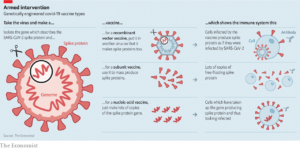
With the development of the different types of vaccines, there comes ambiguity among people on which vaccine to choose? Which one is better? Which one to get? Should we trust the technology or our conventional methods? There are several questions, and no doubt this is one of the primary reasons people are afraid to get vaccinated. So, let us clear all the doubts and get an understanding of the type of vaccines available for Covid so that you can make a clear-cut decision on which vaccine you want to get.
Broadly, there are four types of vaccine. Let us understand each of these:
1. Whole virus vaccine: This is a conventional approach where the weekend/inactivated form of Covid 19 pathogen is used to create specific antibodies in the body and provides immunity against it. Since it uses inactivated forms of viruses, so there are no chances of infection or replication inside the body. It only produces antibodies against the viruses and provides immunity. These vaccines include Sinopharm, Sinovac.
2. Protein Subunit vaccine: In this another type of traditional vaccine where, instead of exposing the body to the complete pathogen, only purified fragments of protein are used to provide immunity against the virus. This type of vaccine is made to minimize the side effects and is best for people with a compromised immune system. This vaccine includes Novavax.
3. Viral Vector vaccine: This type of vaccine is based on a well-established technology in which a vector is introduced inside the body to provide genetic instruction to make antigens. This vaccine helps trigger an immune response in the body. The only drawback of this type of vaccine is that the people already exposed to the vector earlier may be prone to it, and the vaccine would be less effective for them. This one includes: AstraZeneca, Sputnik V.
4. Nucleic Acid (RNA, mRNA vaccine): This type of vaccine is based on the newest technology. In this, the genetic material (RNA/mRNA) of the virus provides instruction to make the antibodies. This vaccine is super cheap and easy to manufacture, and the immune response they provide is also high. This type includes Pfizer-BioNTech, Moderna.
Challenges in developing mRNA-based vaccines
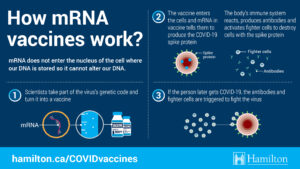
This new era in vaccinology has its own set of challenges. Let’s discuss each of these:
1. RNA’s Instability: The RNA nuclease enzyme present inside the body degrades the mRNA within a fraction of minutes. To overcome this, scientists need to alter the mRNA and make changes in the composition so that the nuclease enzyme won’t attract it.
2. Resistance/Immunity of RNA: The human body considers any foreign RNA as a threat, and any modifications in the RNA can cause different activation inside the body.
3. Delivery efficiency: Intracellular delivery of mRNA is necessary to protect it from RNase enzyme, as it cannot travel alone until the cytosol in the cells.
4. Storage: These mRNA-based vaccines must be shipped and stored at the temperature of -70 °C.
Let’s talk about some of the trial cases of mRNA-based Vaccines
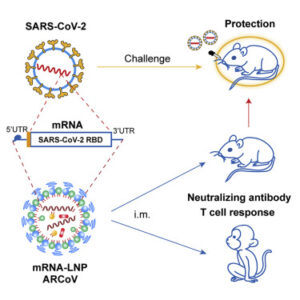
1. A Phase 3, Randomized, Stratified, Observer-Blind, Placebo-Controlled Study to Evaluate the Efficacy, Safety, and Immunogenicity of mRNA-1273 SARS-CoV-2 Vaccine in Adults Aged 18 Years and Older (ClinicalTrials.gov Identifier: NCT04470427): This study trial focused on examining the efficacy, safety, and immunogenicity of the mRNA-1273 vaccine. It is also examined if the second dosage of mRNA-1273 is feasible to prevent the COVID-19 for around two years.
2. Safety and Efficacy of the BNT162b2 mRNA Covid-19 Vaccine (ClinicalTrials.gov number, NCT04368728.): This study trial focused on evaluating the safety, suitability, and immunogenicity of 3 different SARS-CoV-2 RNA vaccine among healthy individuals. The individuals are divided into three sections as per their age. The study consists of two phases. Phase 1 includes the selection of vaccines, individuals, and the accurate dosage, and the second phase includes cohort study and efficacy study.
Let’s understand the Benefits of mRNA Based vaccines
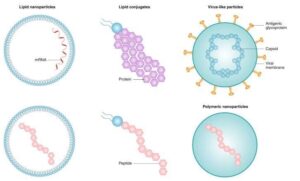
- Effectiveness: As per the researchers, the mRNA vaccine shows 94.1% efficacy in preventing Covid-19 illness. (The New England Journal of Medicine)
- Ease of delivery: These vaccines are developed in two forms: injection and nasal spray. If successful, the nasal spray could be future vaccinology.




